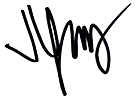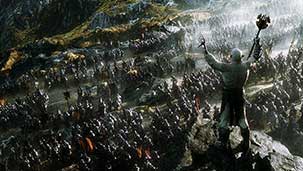Has any major filmmaker of the last two decades followed a stranger and sadder path than Peter Jackson? It seemed as if his journey from schlock-horror cult director to the godfather of digital spectacle was going to be analogous to the one taken by the stalwart band of hobbits in the Lord of the Rings trilogy. But it turns out that Jackson is more corruptible man than incorruptible hobbit. Like Prince Isildur, he’s been seduced by unlimited power. In this case, the power of the pixel.
It’s easy to see why Jackson might identify with those hairy-footed Shirefolk: he comes from a small, out-of-the-way place (New Zealand), he’s pretty hairy himself, and he made a name for himself by accomplishing a seemingly unconquerable task: making epic high-fantasy relevant in a post-9/11 world. When The Return of the King won the Oscar for Best Picture in 2003, Jackson seemed destined for membership in the modern pantheon of cinematic deities alongside guys like James Cameron, Ridley Scott, and, of course, Steven Spielberg. I wasn’t the only who had high expectations. But Jackson’s directorial output, since then, has provided exponentially diminishing returns.
King Kong was bloated, visually overindulgent, and just barely managed to retain a bit of the sweet sentimentality that made The Lord of the Rings more than just geek-bait VFX-porn. The Lovely Bones was likewise bloated, visually overindulgent, and awash in near-diabetic levels of that sweetness. So Jackson, seeking firmer ground (one supposes), returned to the scene of his past successes: Middle Earth. But upon his return it seems he has forgotten some of the basic tenets of filmic storytelling.
In the new Hobbit trilogy, which concludes with The Hobbit: Battle of the Five Armies, Jackson’s once-lovely floating camera has become unmoored. It plummets and spins and turns sickening spirals around tiny digital figures surrounded by unintelligible spaces and incalculable masses of moving objects. Shooting characters small in the frame can be, when used sparingly, a dramatic way to establish scale. But the camera, here, remains at such a remove, and the frame is filled with such incomprehensible digital chicanery, that sitting through these films feels akin to watching a friend hack and chop his/her way through increasingly cluttered levels of a slick-looking video game.
But, no, you’re right, Akshay: making pejorative comparisons to “being like a video game” is a lazy way to frame the complaint. But even though video game cut-scenes have appropriated the language and rhythm of film (visual images shot by a subjective virtual camera, edited together to form a narrative sequence), films shouldn’t look like cut-scenes; in games they serve as a narrative bridge from one controllable moment to the next. In mainstream gaming, no mater how well-crafted or compelling, the narrative is still subtext: interactivity is the primary text. In film, what we see and hear onscreen is the primary text. And when what we see and hear onscreen is this shallow, this indistinct, this two-dimensional (oh, the irony!), it feels less like an interaction with a piece of art than it does a Clockwork Orange-style sensory resilience test.
Is Hobbit: The Battle of the Five Armies the worst offender of these new films? Not necessarily. But if I’m going to defend the Inception-like nested endings of ROTK by arguing that the entire trilogy is one long tale told in three chapters, and that the resolution(s) of that final film are perfectly in scale with the scope of the story that preceded it, then I must also treat these new Hobbit flicks as a whole.
Sure, I’m happy that Jackson has had a chance to reunite with his old pals. Ian McKellen, Cate Blanchett, Christopher Lee, Orlando Bloom—they’ve all returned to reprise their roles, despite the fact that none of them (with the exception of Gandalf) actually appear in Tolkien’s book. The presence of these familiar faces is justified by paper-thin subplots that Jackson and his writing team have cobbled together from the deepest of Tolkien deep cuts—which speaks, I think, to his desperation to recreate the magic of the first three films. Poor Blanchett looks particularly embarrassed to be back: Galadriel was always the most supernaturally composed of the trilogy’s regal figures, but in this latest film she’s just another strutting action hero, appearing briefly in a superfluous fight sequence that also, laughably, features 92 year-old Christopher Lee flipping and spin-kicking like a Tekken avatar being controlled by your hyperactive little brother.
[I feel sorriest for Orlando Bloom, though, who is ostensibly playing a centuries-younger version of himself, yet looks as worn and swollen as Jackson’s increasingly unimpressive shots of armies cresting hilltops at magic hour.]
When we talk about Peter Jackson, we should be talking about him as a peer of Christopher Nolan, not as a peer of Michael Bay. But judging his place in the spectrum of contemporary filmmakers by these last three movies, he’s erring heavily towards the latter.
So, Akshay, why am I telling you all this?
Providing IT support for the vast array of interconnected computers required to design and render this dog’s breakfast of orcs, trolls, goblins, eagles, bats, elves, dwarves, caribou, hogs, castles, villages, mountain strongholds, neo-brutalist fortresses, and oceans of gold coins is no small feat. It’s a thankless, taxing job. But it isn’t necessarily an influential job. There’s a good chance you’ve never even met Peter Jackson. Which is why you’re perfect for this mission.
I need you to get some friends together. Some food, too (might I suggest a calorie-rich ethnic bread?). And some supplies (rope, mithril). You’re going to undertake a vital, perilous task: to venture into the heart of Wellington, New Zealand – to the headquarters of WETA Digital – and press CTL+ALT+DLT on the entire system. It is an evil fate, yes. You will be expected to find a way where the great ones cannot or dare not go. But when all seems lost, when all bonds of fellowship are broken, just remember: even the smallest person can change the course of the future.
Sincerely,

Jared







